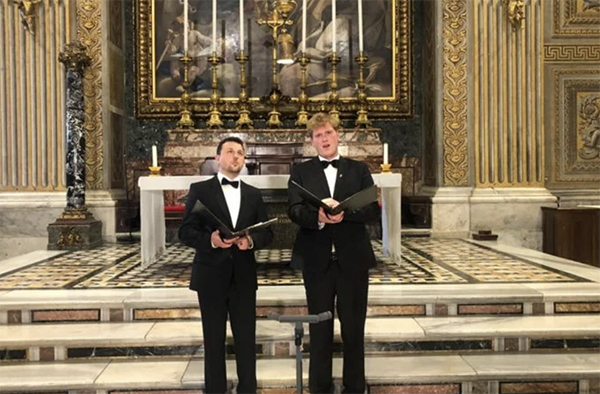
By Inés San Martín
ROME (Crux) — At a time when enjoying choir music in churches is banned almost everywhere in the world due to COVID-19 restrictions, two young German tenors recorded a series of songs inspired by Christ’s passion and his resurrection in an empty St. Peter’s Basilica, with new songs being released every day from Wednesday until Easter Sunday.
On March 16, 2021, Maximilian Daum and Jonas Wuermeling took advantage of an empty basilica and recorded the music to be broadcasted by Germany’s K-TV, Catholic television, and Vatican Radio. The selection of songs is intended to inspire those who cannot travel to Rome this year for the holiest week of the Christian calendar.
The fact that the most famous church in Christendom will be almost empty on Easter gave Claudia Kaminski from K-TV the idea for the performance in St. Peter’s: “If people can’t come to Rome and St. Peter’s because of coronavirus, then St. Peter’s will come to them.”
“It’s also a statement for culture, that has been shut down in this pandemic,” said Stefan von Kempis, head of the German section of Vatican Radio.
Between Thursday and Sunday, the basilica will also host all of the major papal celebrations, including the Easter Mass on Sunday, which is traditionally held in St. Peter’s Square.
The list of 18 songs is a compilation of classic and modern musical selections, including the “Credo” in Latin, “O Head Full of Blood and Wounds,” “True God, We Believe Thee,” “Ave Maria” and Leonhard Cohen’s “Hallelujah.”
Daum and Wuermeling, who’ve been singing in churches since they were members of a children’s choir, began their careers as a duo several years ago, opening the festival of the Hamburg Elbphilharmonie in 2017, and they are currently working with several DJs from around the world to produce an album which they hope “will serve as a bridge between different music styles.”
“Everybody is opening their doors and becoming part of this project to connect people through different music genres,” Daum told Crux of the album. “There’s something for everybody, in several different languages.”
“We want to connect popular music and opera together, build those bridges,” Wuermeling added. “To us, it doesn’t matter if it’s opera, pop or electronic, it’s all music, and if it has a message, if you can feel what the musician is saying, that’s enough.”
Speaking not long after recording the songs in St. Peter’s Basilica, the singers called the experience “incredible, unbelievable, amazing.”
Though both were incredibly exited when Kaminski first brought the idea up to them and during the rehearsals, when the time came to actually go into the basilica and the experience became all the more real, it became an “extremely humbling experience,” the singers said, adding that “you go across the threshold and you begin thinking about all the incredible people who’ve been in here, and all those who’ve left their mark: Bernini, Michelangelo, and so many other artists.”
“Going in when the church is completely empty, despite being broad daylight, leaves you speechless,” they added.
Beyond the religious element of the concert, the two tenors saw it also an statement “in favor of culture.”
During the past year, since the pandemic began, opera houses, theatres and other cultural venues, have been closed through much of Europe. This has left artist unemployed, with musicians such as Daum and Wuermeling unable to perform live.
“We wanted to take this opportunity and offer it as a sign that culture and music are not dead, this is not over,” they said. “And we really do think that those who tune in to listen — or watch — the pieces we’ve prepared will find in the recordings a moment of peace.”
